Master Thesis Reader - Research and Innovation in Higher Education
What Factors Affect German-educated Chinese Master's Students' Decision to Work in Germany?
Xin Deng
Background
Globalisation pushes the internationalisation of higher education, which triggers off the thriving growth of international activities of universities in higher education sector worldwide. Needless to say, students become the main participants in this trend. The salient manifestation of this is the increase of students pursuing cross-border education. For them, employment prospects are their major concerns in this educational investment. The reality, however, is that in recent years there is an increasing number of international students returning back to their home countries upon graduation without being able to secure a job either at home or abroad. Amongst them, the number of Chinese overseas returnees is predominant. Although Chinese demand for overseas education remains strong, due to the frustrating fact that more and more Chinese students return back to China jobless, many Chinese parents and students start to reconsider the benefits of studying abroad. Some prudent strategies can be seen from this reconsideration, to name a few, tying to a national funding that can secure subsequent job opportunities, choosing those study fields aggressively demanded by the job market, or avoiding those overheated study destinations and refocusing on those countries that demonstrate strong and steady economy and favorable policies towards foreign graduates. Germany, in this context, attracts more and more Chinese students to pursue their overseas education.
There are several signs from Germany showing positive job prospects for international graduates. For example, the emphasis on retaining highly educated international students to offset a shortage in German labour market and the German Academic Exchange Service (DAAD)’s Strategy 2020 (2014) that aims at enhancing the internationalisation of German higher education. However, for German-educated Chinese students, they are still faced with challenges when it comes to job seeking in Germany: 1) Language-wise, those who are less proficient in German are highly likely to be disadvantageous in German job market; 2) Subject-wise, those who do not study science and engineering might have less job opportunities in Germany.
The aforementioned situation facing nowadays Chinese overseas students has become increasingly intense. Trapped in the dilemma as to where to seek employment opportunities, they have to make calculated decisions based on their self-evaluation and the analysis of the external environment. Besides, as Germany itself is being short of skilled labours, it is of high importance for German higher education institutions to work out not only how to attract, but also to keep qualified Chinese students within the country.
Research questions
Following this context, this study attempts to explore: what factors affect German-educated Chinese Master’s students’ decision to work in Germany upon graduation? The consideration concerning focusing on master’s students is that 1) Chinese students pursuing Bachelor’s degree in Germany are fewer than those doing Master’s. This is partly due to the difference of high school system in two countries and the lack of recognition mechanism regarding higher school qualifications; 2) apart from the limited number of Chinese Bachelor’s students represented at German higher education institutions, the tendency of their plans upon graduation is mostly to move up to the next level to further their study. In this case, the inclusion of Chinese Bachelor’s students would somehow invalidate the focus of this study, which is examining students’ decision to work; 3) the exclusion of Chinese Ph.D students in Germany is mainly concerned with the fact that most of them are funded by Chinese governments, and thus there is an obligatory binding that requires them to return to China upon graduation. Since the study deals with students’ intention to work in Germany, Chinese Ph.D students are not an appropriate target in this case.
Based on the above background, the core research question can be broken down into two sub questions: 1) What internal factors and external factors affect German-educated Chinese Master’s students’ decision to work in Germany upon graduation? 2) What are the implications and suggestions for policymakers in Germany and China in terms of attracting qualified German-educated Chinese graduates?
Theoretical background
The theoretical background of this study revolves around employability. Up to date, the debate over how to define employability accurately for its own sake and how to make its definition reach a wider range of audience has not yet ceased. The dilemma has it that whether or not employability merely refers to securing a job, or it carries more complex attributes that might go beyond work scope.
Over time, several models have emerged in response to the interpretation and understanding of employability. This study, due to its specific focus, lays its theoretical foundation on the model proposed by Dacre Pool and Seswell (2007) – “The CareerEDGE model of Gradate Employability”. The following diagram shows the details of this model.
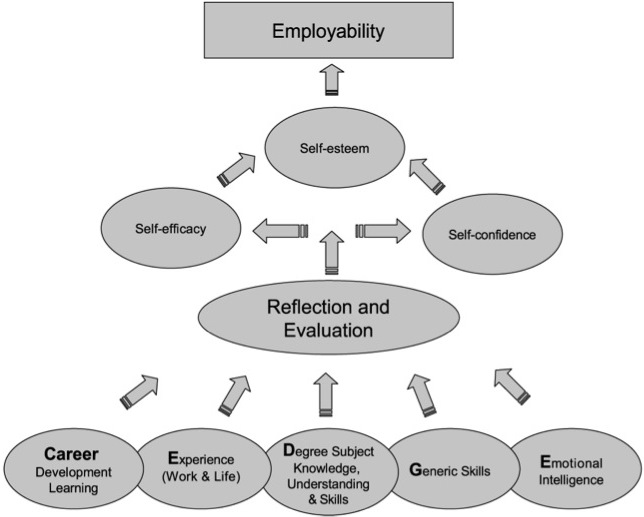
As they assert, the elements included in this model are all essential. A missing of any element will result in a severe reduction in graduate’s employability. In the meantime, they stress that certain degree of overlap between some elements is recognised. Therefore, a visual presentation of the model is made to reflect this overlap, as well as the interaction between the various elements (Dacre Pool & Sewell, 2007, p. 280).
As is shown, there are two tiers in this model. The lower tier consists of five basic elements that students can work on to approach their employability. The middle tier, which is reflection and evaluation, calls for a high level of processing on what students have already acquired so that ultimately and hopefully their self-esteem, self-efficacy and self-confidence, resting at the high tier and closely linking to employability, can be improved.
The comprehensiveness and accessibility of this model considerably increases its practicability in the field of employability research. As is explained by Dacre Pool and Sewell (2007, p. 287), “this model allows lectures, personal tutors, career advisors or anybody else involved with the promotion of employability within higher education to do so without clouding the issue in complexity”.
Therefore, the study will rely on this CareerEDGE model to design the pre-test interview, which aims at collecting the first-round empirical data concerning how German-educated Chinese Master’s students perceive employability. Further, this model will also be used as an instrument to structure the followup online survey.
Methodology
The choice of research methods shares a close link with the defined research question. With different research purposes, the choice can go to either a qualitative or a quantitative approach, or a mix of both (Johnson & Onwuegbuzie, 2004). Qualitative methods rely on articulated explanation to contextualise certain social behaviours and detect how social experiences are given meanings, while quantitative studies focus on the analysis of causal relationships between variables, and thereby generalise a certain pattern (Denzin & Lincoln, 2003, p. 13). However, today the combination of both methods is plentifully seen in many studies. The legitimacy of such mixture lies in the assertion that at operational level studies are located at different points of a continuum between qualitative and quantitative (Newman & Benz, 1998, p. xi).
Since this study is rather exploratory, it requires not only in-depth analysis to better approach the target issue, but also a reasonable generalisation to validate its results to a wider audience. Therefore, a combination of both methods, qualitative and quantitative, is adopted. Precisely speaking, qualitative method will be used for analysing the empirical data generated from the six pre-test interviews, whereas quantitative method can be seen from the statistics of the online survey results. The following figure shows the process and design of this study.
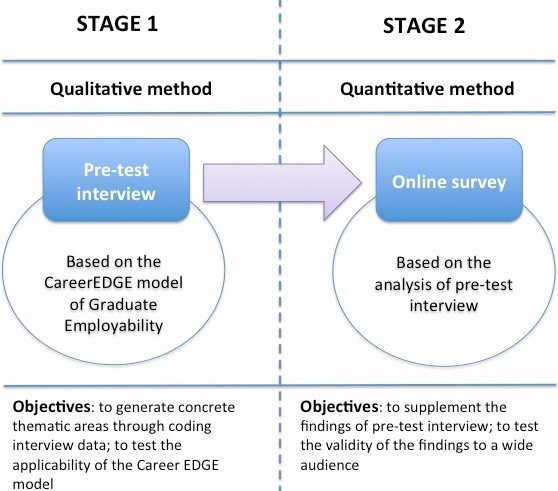
Pre-test interview
The main purpose of conducting pre-test interviews is to test to what extent the chosen theory is applied to the subject of this study – German-educated Chinese Master’s students. On top of it, the generation of several concretethematic areas is expected. They would serve as the basis for the second stage of data collection.
The pre-interview questions are based on Dacre Pool and Sewell’s CareerEDGE model of Graduate Employability (2007). The questions are mainly designed to be open-ended, except some regarding background information of interviewees. Each question designed is corresponding to a certain element in the CareerEDGE model. Interviewees are expected to answer the questions that apply to their situation, and in the meantime, encouraged to react promptly to emerging important issues. At the end of the interview, interviewees are expected to give comments on their own or interviewer’s performance over the course of the interview, as well as possible suggestions to improve the interview design.
Online survey
The very motivation of designing an extended online survey is to validate the findings of the interviews to a wider audience. It is hoped that by involving more German-educated Chinese Master’s students to participate in this study, relatively convincing conclusions can be made and more constructive suggestions regarding employment in Germany can be provided for relevant interested parties, like students themselves and national policymakers, either from German side or Chinese side.
The platform used for designing and processing this online survey is LimeService. It is a free and open web server-based software, which enables users to develop and publish online surveys, and collect responses without doing any programming. This platform is widely used among researchers in the filed of social science.
In summary, 1) there are two stages to collect data: a. the six pre-test interviews based on the CareerEDGE model, and b. the online survey extendedly designed to validate and enrich the findings from the analysis of the six pre-test interviews. 2) A mix of qualitative methods and quantitative methods are used to process the empirical data generated from the two aforementioned stages.
Key findings
- The main findings obtained from the analysis are summarised as follows:
- In general, German-educated Chinese Master’s students are willing to stay in Germany for work if a job can be offered in line with their studyfield, compatible with their personality and possibly related to their personal interests.
- German proficiency is expected by most German employers. Moreover, it is believed that German proficiency outweighs study field when it comes to job seeking in Germany.
- For Chinese students, emotional intelligence (EI) is not influential in deciding whether or not they work in Germany, even though they admit that it can somehow improve their job performance.
- German-educated Chinese Master’s students are open for job opportunities regardless of the location, as long as the opportunities are perceived to be beneficial for their future career.
- Work experience in Germany is seen as leverage for outrunning the other peers in the Chinese job market. Therefore, working abroad for a certain period of time and then going back to China to seek better job opportunities tend to be a plan amongst a majority of Chinese students.
- Universities offer a series of service to help students to enhance their employability. Career Centre in this respect plays an active role. However, Chinese students usually do not participate because of their financial burden and study pressure.
- The quality of living environment and social environment in Germany is the primary incentive for German-educated Chinese Master’s students to stay and work in Germany.
- Family issue is central to the decision as to whether or not Chinese students would work in Germany. On the one hand, Chinese parents expect their children to return, and on the other hand, for those Chinese students who have spouse or relationship in Germany, they are inclined/made to stay.
- The cooperation between China and Germany is growing, which will create considerable opportunities for German-educated Chinese Master’s students. Therefore, they express certain optimism towards the German job market.
- The daunting German bureaucracy manifesting itself in visa issue shuffles Chinese students back and forth, making them passive and staggering in the German job market.
Recommendations
Whether or not German-educated Chinese Master’s students stay and work in Germany, in itself, does not necessarily bring about social significance. However, if further broadening and deepening this issue, one might realise that students’ employability might have a potential impact on society as a whole. Therefore, how to enhance their employability in order for them to better cope with the job market deserves certain attention.
Based on the main findings of this study, suggestions and recommendations can be made from three levels: individual level, university level and social level. At the individual level, students themselves are the main engine to produce intended quality; at the university level, universities are defined as a facilitator to provide favourable conditions; at the social level, governments and markets are treated as a guardian to protect desirable outcomes. The following table elaborates corresponding suggestions and recommendations at the respective level.
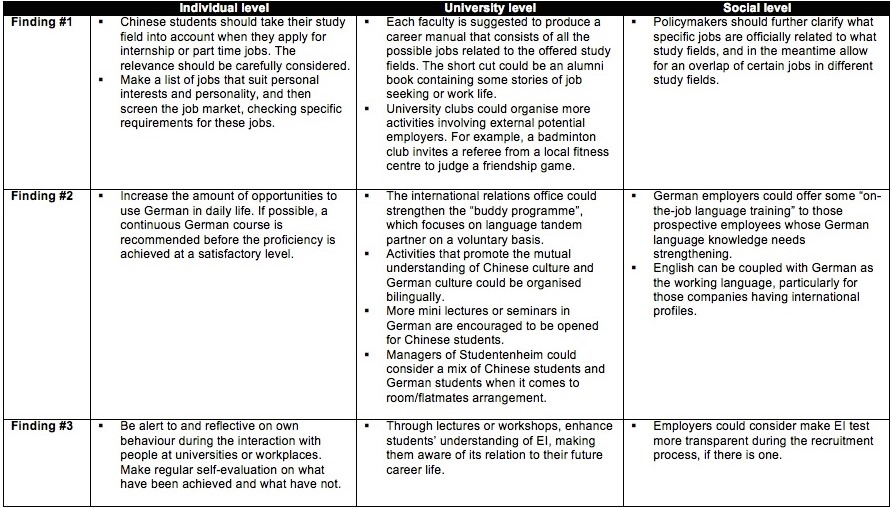
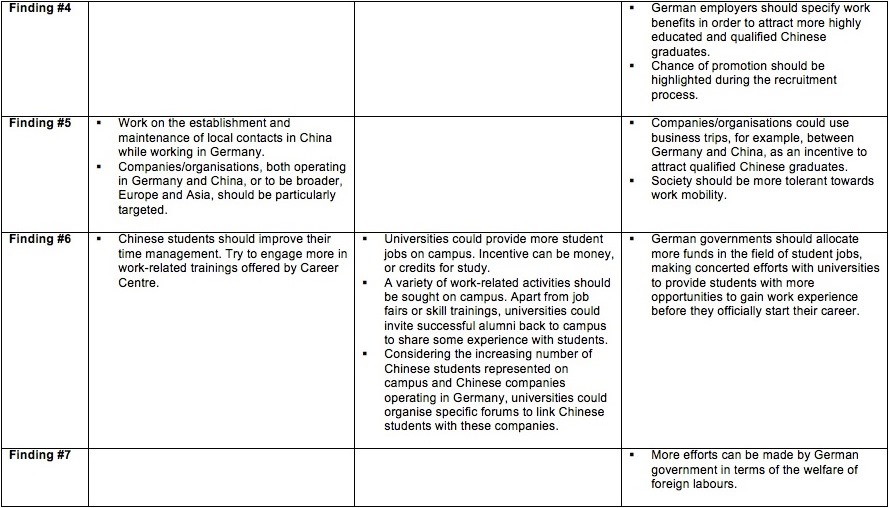
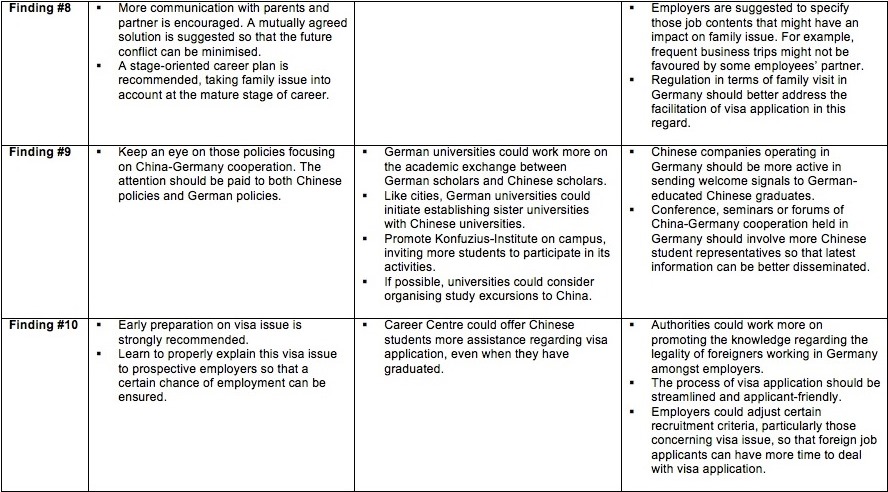
Implications for further research
This study elicits a number of interesting topics to work more on. For example, 1) the analysis of German-educated Chinese Master’s students’ generic skills from the German employers’ perspectives; 2) work mobility of Germaneducated Chinese Master’s students; 3) the exploration of the cooperation mode between German higher education institutions with potential Chinese employers; 4) what factors affect German-educated Chinese graduates’ decision to return back to China for work; 5) readdressing the role of Career Centre at universities, particularly focusing on its activity outcomes and accountability.
References
DAAD. (2014), DAAD Committee adopts Strategy 2020 (May 15). daad.de. Available at: https://www.daad.de/portrait/presse/pressemitteilungen/2013/23109.en.htm.
Dacre Pool, L. & Sewell, P. (2007), The key to employability: developing a practical model for graduate employability. Education & Training, 49 (4): 277-289.
Johnson, R. B., & Onwuegbuzie, A. J. (2004), Mixed methods research: A research paradigm whose time has come. Educational Reseacher, 33(7): 14.
Denzin, N. K., & Lincoln, Y. S. (2003), Introduction: The discipline and practice of qualitative research. In N. K. Denzin & Y. S. Lincoln (Eds.), Collecting and interpreting qualitative materials (pp. 1-45). Thousand Oaks, London, New Delhi: SAGE Publications.
Newman, I., & Benz, C. R. (1998), Qualitative-quantitative research methodology: Exploring the interactive continuum. Carbondale: Southern Illinois University Press.